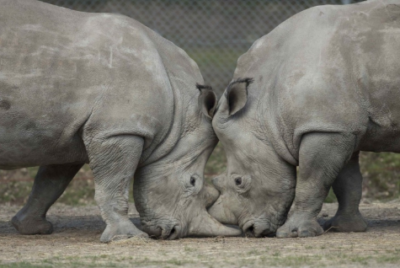


By: Simon Denyer
BEIJING — Slowly but surely, Chinese attitudes toward wildlife conservation are changing.
At China’s annual parliamentary session, lawmakers from Hong Kong have submitted a formal proposal to ban the commercial farming of bears for the extraction of their bile and urged stronger efforts to combat the illegal trade in rhino horn, officials said Tuesday.
Separately, there were also calls at China’s annual legislative and consultative assemblies for an end to tiger farming in China and for a ban on the use of pangolin scales in traditional Chinese medicine.
Conservationists welcomed the moves, which reflect a gradual change in Chinese attitudes toward endangered wildlife and the use of wildlife products in medicine, as ornaments or in food.
“This great result for rhinos and bears just goes to show how a bottom-up approach can work, from grass roots all the way up to the Politburo,” said Alex Hofford, a wildlife activist from the conservation group WildAid in Hong Kong.
Although the use of rhino horn has been banned in China since 1993, demand from Vietnam and China continues to push the animal close to extinction. On March 7, poachers even slipped into a Paris zoo, shot a rhino several times in the head and removed its horn with a chain saw.
Chan Yung, a member of China’s National People’s Congress (NPC), said he had secured 26 signatures from fellow lawmakers to support a formal “bill suggestion” calling for a comprehensive animal protection law. The signatories all came from Hong Kong, which has a total of 36 delegates in the 2,987-member NPC.
While this move was only backed by a few lawmakers in a large assembly, similar efforts did help build momentum for an ivory ban, and there is growing awareness of wildlife and animal welfare issues in China, especially among younger, urban citizens.
Chan’s proposal called for a ban on “cruel practices” such as the extraction of bile from live bears, as well as stronger law enforcement and international cooperation to counter the illegal trade in rhino horn.
Chan also submitted proposals in 2015 and 2016 advocating a ban on ivory use in China, a move that may have contributed to Beijing’s announcement at the end of last year of plans to completely shut down the trade.
Although the NPC is seen largely as a rubber-stamp assembly, its annual meeting does provide a forum for lobbying within China’s one-party state.
Under NPC rules, the body’s Standing Committee is obliged to respond within a year to any bill suggestion that garners 30 signatures. Chan gained 32 signatures for his proposals on the ivory trade, but failed to reach that threshold this time.
Nevertheless, he expressed hope that there would be a response.
Elizabeth Quat, a politician from Chan’s party, the pro-Beijing Democratic Alliance for the Betterment and Progress of Hong Kong, has been the driving force behind the proposals, spending years in what Hofford called “relentless lobbying.”
She said the ivory ban was evidence that internal lobbying can produce results but stressed that officials needed to be encouraged and made to feel “proud of what they are doing” rather than criticized.
“If you make them look ugly, they will just defend themselves and not change at all,” she said. “If you encourage them to do something together, then attitudes change.”
More than 10,000 bears are farmed in China, most kept in small cages, with their bile periodically — and painfully — extracted for use in household products and traditional Chinese medicine.
Quat said she had initially hoped to include a suggestion to ban the trade in dog meat in the proposal but failed to gain sufficient support.
Separately, another NPC delegate, Zhang Dayong, who is also the director of the Ecology Research Institute at Beijing Normal University, called for an end to the use of pangolin scales in traditional Chinese medicine, local media reported.
In September, the Convention on International Trade in Endangered Species (CITES) banned the import and export of pangolin products, but their use in Chinese medicine remains legal and the government retains a stockpile of scales that it periodically issues into the market.
High-profile cases of the illegal consumption of pangolin meat in China — including at a lavish banquet held by local officials in southern China — gained huge attention on the Internet here and have brought the issue into the national discourse.
But Iris Ho, wildlife campaigns manager at Humane Society International, said the use of scales in medicine is a much bigger factor in fueling the poaching and trafficking of pangolins.
“Pangolins have no chance of survival if China continues to legitimize the use of pangolin scales for medicinal use,” she wrote in an email.
At a parallel meeting of the Chinese People’s Political Consultative Conference, a toothless advisory body, delegate and artist Yuan Xikun tabled a resolution calling for the closure of commercial tiger farms.
China has some 200 tiger farms, with more than 5,000 big cats kept in often cramped conditions for public exhibition and to feed a thriving underground industry in tiger-bone wine and pelts, in contravention of Chinese law and its obligations under CITES.
Debbie Banks of the Environmental Investigation Agency (EIA) said trade in tiger parts posed a “very serious threat to the survival of wild tigers.” She said she was heartened to see the issue being raised.
“EIA hopes that China’s leadership is listening, and will seize this opportunity to stop the breeding of tigers for domestic trade in their parts and products, destroy stockpiles of tiger parts and products and engage with relevant experts to start phasing out tiger ‘farms,’” she wrote in an email.
In an interview, Wang Weisheng, deputy director of the animal protection department at China’s State Forestry Administration, said that any use of rhino horns in China would be investigated and punished by law.
He added that his department was consulting with the Traditional Chinese Medicine administration on the question of whether to remove pangolin scales from a list of approved ingredients.
But he said experts were divided as to whether the commercial farming of bears was helpful or harmful toward conservation of the wild population, and denied that China’s tiger farms were using the animals to produce tiger bone wine.
Stay in touch and get the latest WildAid updates.
SIGN UP


